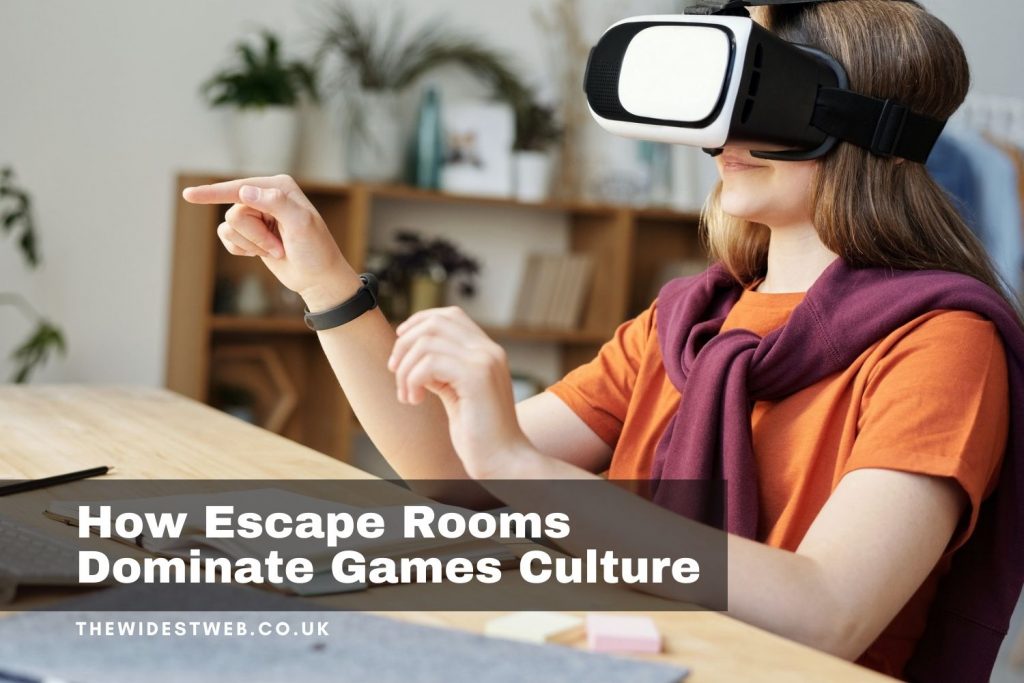
Escape room gaming is a global phenomenon that has gained traction increasingly in the past few years in the world.
The concept is simple: a group of people locked inside a thematic room needs to escape by solving puzzles and clues.
But this apparently simple and fun activity has impacted the gaming industry and human lives to a much deeper level and with virtual escape rooms, it has also taken over the internet.
The History of Escape Rooms

Escape rooms originated from a simple point-and-click Japanese video game called “Crimson Room” in 2004. in 2007, a publishing company named SCRAP came up with a concept like that of the game and created the first modern escape room experience called “Real Escape Game.” In this game, players were placed inside a room and were given the challenge to solve a mystery to escape the room within the allotted time.
The concept was an immediate hit and took over the continents of Asia and Europe in rapid succession.
Slowly, the trend reached the shores of the U.S., and by 2012, SCRAP Entertainment had established its first American escape facility in San Francisco. Three years later, the number of escape rooms in the country crossed the mark of 350. And by 2018, the number grew even bigger, with 2,300+ escape rooms dominating the U.S. market.
Even from a global perspective, between the years of 2007 to 2019, the total number of escape rooms all over the world is approximated to be somewhere around 50,000-60,000.
How are escape rooms changing the gaming culture?

In modern times, the term “gaming” comes with a very specific set of pre-conditions. Firstly, it almost exclusively implies online gaming. And secondly, it is usually narrowed down to a typical set of games. So, even though technically playing board games should also be considered gaming, that is not the cultural implication of the term.
At the same time, playing an online game like Candy Crush (a simplistic puzzle game, infamous as only meant for the older generation) would also be excluded from the context of the word “gaming” since it does not fall into the niche.
Now, how does escape room gaming come into such a restrictive space and revolutionize it? The answer is simple: by democratizing the space to a large extent.
In the pandemic era, escape rooms have undergone an impressive makeover to create an evolved, Covid-friendly version, i.e., virtual escape rooms. Even with the lockdown restrictions lifted, the popularity of virtual activities only grew thanks to its convenience, unmatched levels of immersion, and flexibility. Anybody could play the games without needing any prerequisite knowledge or skill set. And they come in a hoard of themes and storylines, so there is something for everyone.
While this evolution allowed the escape industry to survive the massive blow of the pandemic, it also created discourse about whether it counts as gaming or not. But most escape companies seem to be projecting a different message: virtual escape games are not gaming. They are better than mobile gaming!
In their latest phase, virtual escape games have become live-streamed experiences where a live-actor sends players a real-time video feed from the actual escape room. Players can scan the room and instruct the on-site actor to do certain tasks to unveil hints and solve puzzles. This is a much more immersive experience than normal video games like Minecraft with adventure maps for example. You get to live the real thing, and you are not fighting against a pre-set algorithm, so the possibilities are endless!
Perhaps one of the biggest upper hands that escape room gaming has over traditional gaming is its balanced nature. Escape rooms are essentially time-regulated activities.
One virtual escape gaming session will last an average of 60 minutes. When compared to the long-running designs of video games, this is a very reassuring quality for preventing harmful addiction. One of the severest stereotypes that the gaming community faces is that
gaming is addictive and reductive. But with virtual escape rooms, you have a time-balanced
gaming activity that also comes with educational, soft skill-enhancing features.
How are escape rooms dominating social life?

The relevance of escape rooms in social life was significant even before the pandemic. Whether it is online or offline, escape games, by virtue of their very concept, are a very social activity. You play the game in teams, you are constantly required to communicate with your teammates, seek help and help them out in return, and learn how to work towards a shared goal.
Escape games come with plenty of chances to interact with teammates freely, get to know their fun sides, and explore their strengths and weaknesses. It also allows you to get comfortable with the idea of asking for help when you know you cannot do something alone. In today’s world, where all of us live very isolated lives, escape rooms remind us of the upsides of community living and co-dependence.
In the pandemic-stricken world scenario specifically, virtual escape rooms became a great source of comfort for many. Stuck in lockdowns confined at home, people were suffocating and battling with loneliness.
Virtual escape rooms allowed them to re-connect with family, friends, and colleagues in a much more spontaneous way than just a plain awkward video call. This simple game also helped people take their minds off the constant stress and anxiety of the pandemic.
Final Thoughts
To think that all of this was made possible by such a fun and straightforward concept is amusing. It wouldn’t be an exaggeration to say escape games came in swinging to help take care of people’s mental health when the world seemed to be falling apart during the Covid pandemic. And at the same time, it set some precedents in the world of gaming that shifted its boundaries, even if by just a little. We have no reason to doubt that far in the future when mankind looks back at its best innovations, escape room games will find a shiny spot on the list.
Author Bio: Charlotte Lin is a content creator at escaperoom.com. She’s a passionate young woman, mother to an amazing nine-year-old, and an avid reader. Over the years, writing has helped her explore and understand the world as well as her own self. She loves to travel, meet new people, and spend quality time with her daughter. You can find her on LinkedIn.

